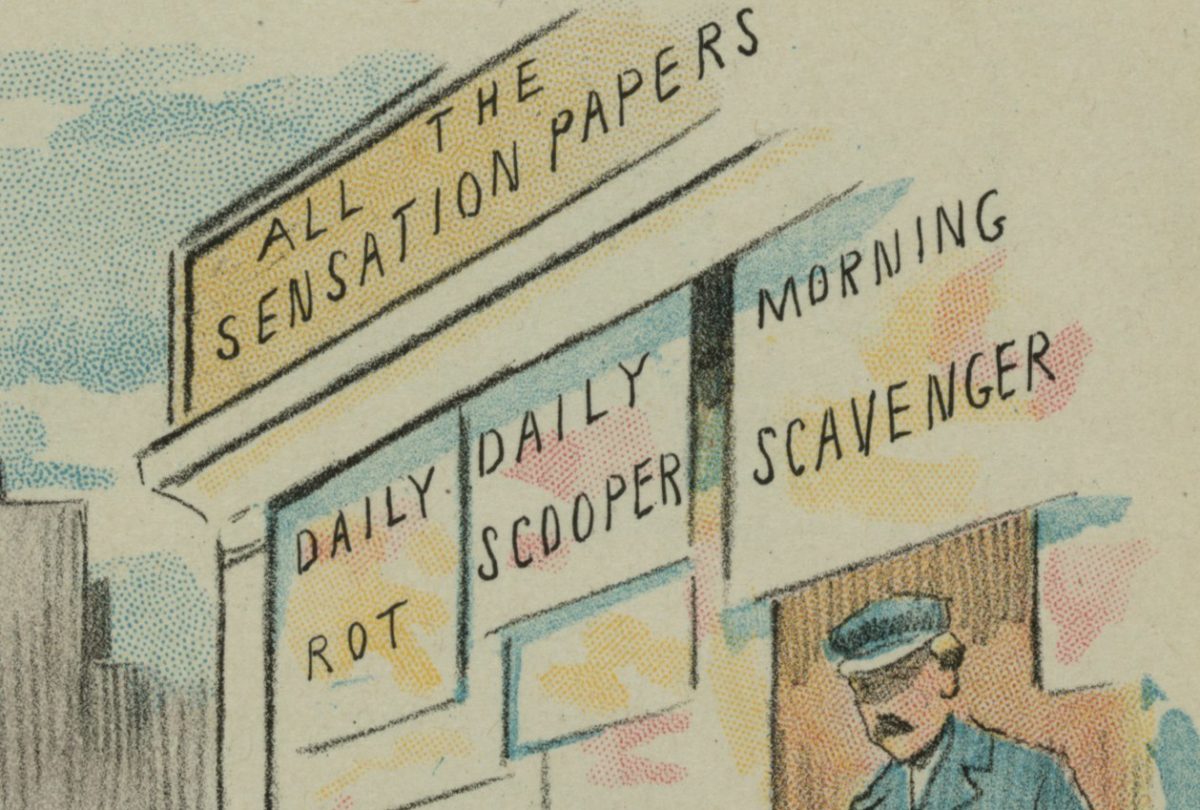The thing about this job, I used to say, is that it’s 95 percent pain tolerance and five percent skillset. That was back in the late 2000s when my job was working the late-night breaking news shift in the Miami Herald‘s Broward County bureau. The office and the job no longer exist, but there’s no point in pretending that a reporter saying that a journalism job no longer exists is noteworthy.
At the time, I described my job as 95 percent pain tolerance and five percent skillset because much of my work was meeting people on the worst days of their lives and asking them to talk about it to me, a complete stranger, for publication in a newspaper read by thousands and on a website read around the world. I wrote about people killed by guns, people drowned in pools, and people dead in car crashes. I talked to grieving mother after grieving mother. Sometimes, a parent would ask me if the pain would ever go away. I told them it wouldn’t.
When I was assigned the night shift, my editors told me that I would do it for one year then be moved to days. One year turned into six, including two-and-a-half on the same gig in the Miami office. There were spurts when I was moved off the job, but they always ended a few weeks or a few months later with me being put back on nights because someone had to do it; and bringing in a new person wasn’t an option given the perpetual hiring freezes, furloughs and layoffs; and I was good at it. Or at least that’s what management told me.
So I did it, then I did it some more, and then I got burned out and quit, another boring and average ending for a journalism story. I had hit my own personal pain tolerance, mostly due to the work but also because of the sheer amount of going-away cakes I ate, pay cuts I took, and retirement beers I attended. Lately I find myself turning over that time period again and again in my mind, as yet another economic collapse destroys yet another round of journalism jobs—many of which will be lost forever—and another round of pundits pontificate on what can be done to save local journalism. The economic collapse after 9/11 came during my first local newspaper job, working at the college paper. The Great Recession happened during my second newspaper job after college. And I long ago stopped counting the times I have been furloughed, given a pay cut, told to please not work for awhile, or nearly been laid off. My entire career has been marked by various stages of the journalism death dance.
When I first said it, 95 percent pain tolerance, five percent skillset meant the ability to hold space and have compassion for people in mourning, who were being asked to do so much when the world seemed at its worst, while still doing my job. But more recently, I find myself applying the formula to what’s left of local journalism itself. There’s only so much any human being can tolerate. At what point are reporters, and not just the night shifters, being asked to do too much? At what point is every reporter on the edge of all the pain they can take?
I read about journalism layoffs because that’s what journalists do. The New York Times estimates that 33,000 media jobs have been affected by layoffs, furloughs, or pay cuts since the COVID-19 crisis began. I check the layoff tracker on Poynter. I read story after story after story about how local news, where I started out, is dying. Everyone in every story or tweet proclaims they are very sad about the current state of local journalism and unsure of how to fix it beyond a pithy “subscribe to your local newspaper,” the journalism equivalent of “I’m sorry for your loss.” It sounds nice, but conveniently ignores the gruesome details of what’s actually going on.
Local journalism is disappearing right before our eyes. But you knew that. That’s been happening for decades now, with newspaper subscriptions plummeting for my entire life. There’s even a Wikipedia page titled “Decline of newspapers.” I know I should pivot next to an extended paragraph about how all this matters because who else will attend city council meetings and cover local elections and report on high school sports, all the building blocks of a typical local paper. But you know that too. And you know that local newspapers are, or at least for a long time were, where the vast majority of reporters actually learned how to do reporting (and that kid at the digital shop that seems pretty good was probably trained by an ex-newspaper person). Everyone knows what local journalism does and everyone agrees it is very important but so what? When I worked in local news, people were always telling me how “important” I was—and I hated hearing that because those words did not put any more money in my dwindling bank account. Prizes and pride are two things you cannot eat.
More than a decade ago, still working that night shift, I sat at my desk when I read Clay Shirky’s blog post Newspapers and Thinking the Unthinkable. I have yet to see any piece of writing that so succinctly summed up what was happening to me, my colleagues, and our entire profession of local newspapers.
The unthinkable scenario unfolded something like this: The ability to share content wouldn’t shrink, it would grow. Walled gardens would prove unpopular. Digital advertising would reduce inefficiencies, and therefore profits. Dislike of micropayments would prevent widespread use. People would resist being educated to act against their own desires. Old habits of advertisers and readers would not transfer online. Even ferocious litigation would be inadequate to constrain massive, sustained law-breaking. (Prohibition redux.) Hardware and software vendors would not regard copyright holders as allies, nor would they regard customers as enemies. DRM’s requirement that the attacker be allowed to decode the content would be an insuperable flaw. And, per Thompson, suing people who love something so much they want to share it would piss them off.
I have no doubt there will be a New York Times in the future. There will be a CNN. There will a Washington Post and a Los Angeles Times and an Atlantic and whoever else is fortunate enough to be owned by billionaire benefactors. Which isn’t to say those places have it made; they don’t. But nobody believes there will be a wholesale disappearance of national news. The White House Press Corps is not in danger.
But what about everyone else?
I can’t pretend to have an answer for how to pay for local journalism. I worked in it long enough to know that is a tough question to answer because the profit margins are not approximately a bazillion dollars and every community needs something different. If there were any easy answer that wasn’t “Gannett/Gatehouse owns nearly every newspaper in America,” people would have done it by now.
But what keeps me up at night is worrying about reporters, the physical human beings who do the work. On my good days, I feel like I could go on for hours about how much I loved working at newspapers in Florida. How much I learned from the old hands who had been in newsrooms since before I was born and the advice they gave me that I still turn to, more often than not. How much I learned from the other young reporters around me. The way I felt like a part of a long tradition, in a good way, that grounded me and gave me a sense of purpose and self. The way it felt during a crisis to be a lifeline for the community. I made lifelong friendships at local newspapers. I met my husband at one too.
But at some point, every human being hits the limit of what they can take. Lately, I’ve been remembering how hard it was to work in local news. Answering the newsroom phone and getting barraged with reader complaints about things I hadn’t done and couldn’t control. Going to the scene of a crime in a neighborhood that the paper had been ignoring and having no good explanation for why reporters only showed up when there was a homicide. Fumbling for words when someone asked why we hadn’t covered something, looking for the polite version of “we ran out of people.” Not just taking furloughs but once being told that I had to change how I picked my furlough dates because the way I was scheduling them was inconvenient for management.
Ken Doctor summed it up best back in January:
What’s the biggest problem in the news business? The collapse of ad revenue? Facebook? Dis- and misinformation? Aging print subscribers? Surprisingly, over the last year numerous publishers and CEOs have confided what troubles them most: talent. … Who wants to work in an industry on its deathbed? Especially in an already tight job market.
There will be some form of local journalism in the future. But will anyone be left who wants to do it?




Ax The Oxford Comma says:
I was recently laid-off for the second time in three years from a local journalism job, and god help me, I’ll probably go right back into the shitshow that is modern journalism, should I be lucky enough to land a gig.
This post is as good of an explanation of the nihilistic feelings I’ve had over the last month or so. My god, what a bleak world we live in…
April 23, 2020 — 2:52 pm
Dreadspun says:
Wonderful as always, Diana.
I live near Winston-Salem, NC, where one of the first big stories I read in the Journal was about the injustice done to Daryl Hunt and as recently as five years ago, they were breaking stories on pollution cover-ups at local schools.
There are still occasional bright spots but for the most part, the paper just runs press releases.
And I think you’re dead on…the biggest factor is that they ran out of people.
April 23, 2020 — 3:09 pm
David Dyte says:
There will always be someone. They might not be very good. And maybe they won’t want to work for $10 an hour and free tickets to an unaffiliated minor league team.
April 23, 2020 — 3:46 pm
HollowFuckStumble says:
I would be happy to subscribe to this website because I love the ex-Deadspin staff and the stuff yall write. I would not subscribe to my local paper, because as you said, unfortunately it is understaffed and the content is trash. So, please make Unnamed Temporary Sports Blog the Unnamed for the Foreseeable Future Sports Blog and take my money. UftFFSB fucking rolls off the tongue.
April 23, 2020 — 3:58 pm
Thecommentarrorist says:
50 bucks/year or something? Here.
April 24, 2020 — 12:48 am
D.S. says:
I left the local news industry one year ago this week. The man who hired me to my last newspaper job told me not to “plan on it being a long-term kind of thing.” Eight months later, he retired. He announced his retirement on another new hire’s first day. I was hired to do the job of two people on a desk that was downsizing from twelve people to nine. By the time I left, it was down to four. Working in local news was the best education I could have asked for, and I loved my coworkers, but it damaged my mental health in ways that I fear may be irreparable.
April 23, 2020 — 4:08 pm
Aquacow says:
;_;7
April 23, 2020 — 4:15 pm
biff_wonsley says:
In my central Texas city, the local paper is a pile of trash and isn’t even printed in town. They sold their building for condos or some shit and now the paper is all wire stories.
But what’s taken its place, or maybe what just continues to exist because it’s always existed, is local TV news. Much of it is silly, but they do the occasional corruption scandal, tell us sort of what’s happening in local politics, etc. That’s the present and future of local news. It’s television. It’s all we’ve got and probably all we’ll ever have.
April 23, 2020 — 5:04 pm
Dreadspun says:
We have one really good station left in the NC Triad, but two of the other three became press release machines over the last decade (just like the local papers I mentioned in my previous comment) and the last one is owned by Sinclair. Good weather on our Hearst station, though. Our OTA antenna is always tuned to them by default.
April 24, 2020 — 7:53 am
Garfield Thelonius Remington III says:
They’re all being snapped up by large conglomerates just like the papers. Sinclair owns some massive percentage of them nationwide and runs pro-Trump bullshit. My hometown local news station in RI had to do that ridiculous “we won’t do fake news” ad read a few years ago.
April 24, 2020 — 10:19 am
Deaner says:
I worked seventeen years and two weeks at a newspaper in a declining midwestern city. I, along with 77 percent of editorial, was laid off on St. Patrick’s Day of this year. It turns out unemployment pays 80 percent of what my job did, with the additional benefit of not having to deal with the public’s many complaints about how my coworkers did their jobs.
Sure, my former employers didn’t pay me the required severance package because of the pandemic, and I didn’t get paid for any of my unused vacation for the same reason. But there are also no more special issues to do in addition to the regular deadlines. No more covering for someone on vacation while also covering for the two coworkers laid off in 2007 and never replaced. No more having to stay late to fix someone else’s fuckups. No more pointless staff meetings, being required to work weekends, or eleven year gaps between vacations.
Maybe the public is right; Maybe journalism was never worth it.
April 23, 2020 — 6:45 pm
Ian says:
I got out. Found a safe, secure government job with benefits. It’s boring as hell but I can pay the mortgage and not worry about my kids starving.
The obvious next question is how will the erosion, the disappearance even, of local journalism impact society? What happens when no one knows what councils, school boards, etc. are doing?
I confess much of the time I came home late or filed my copy the next morning I asked myself “what is the fucking point?”
I suppose we’re all gonna find out.
April 23, 2020 — 7:12 pm
Gestalty Bitch says:
I feel like that’s been going on since the 80s, conveniently when we started hearing the rallying cry of the media having a liberal bias. Now people skip local news and get a gossipy version of news via Facebook or the like. We’re more poorly informed for the change. It will get worse before it can get better because too many aren’t interested in what is true—so long as their team is winning.
April 26, 2020 — 3:07 pm
Thecommentarrorist says:
Dammit Diana, seriously: what the hell will any of us do without learning of Gimadiah Scrogum?
Excellent piece.
Again, crying.
April 24, 2020 — 12:45 am
Garfield Thelonius Remington III says:
I freelanced for a little while at my hometown’s newspaper between passing the Bar and getting my first job as an attorney. My primary assignment was covering monthly town council meetings in three of the towns we serviced. They paid me $50 per story.
I would have happily done that for a living, if I could have. Still would now. But no one can live on that, or put in the required attention and effort when that’s the reward. And that’s where the real stories and the everyday corruption lives. City Hall and the State House, school board meetings and local chambers of commerce, neighborhood associations and local political groups. It’s going to thrive there on a level unheard of since the Gilded Age, maybe even since before then.
April 24, 2020 — 10:24 am
Gestalty Bitch says:
It takes so much of my energy to keep up with the shenanigans my local school board is up to. Sometimes it feels hopeless—and I’m not even a journalist. I’m just someone who is negatively affected by their conservative activism.
April 26, 2020 — 3:08 pm
Bobby McObvious says:
It just never, ever, ever seems to let up. And yet, 20 years in, I still can’t think of anything else I’d rather do. No layoffs in this crisis so far, but my org is looking at across-the-board pay cuts.
April 24, 2020 — 11:01 am
Jason says:
Every time I see your byline, I figure I’m going to learn something and I’m going to feel something. Thank you once again.
April 24, 2020 — 5:59 pm
Helpimabug says:
This.
April 24, 2020 — 11:53 pm
Typingperson says:
Aw, thanks for writing this, Diana. One other thing that someone touched on in the comments: daily story quotas. I do a whole lot more press release stories now than I used to, because of story quotas. I used to do none. Now I’m too busy hitting quotas to get out there and find out what’s going on. That kind of reporting is time-consuming.
April 25, 2020 — 11:20 am
abikemessengerinseattle says:
I’m not totally sure my job will exist when my furlough ends. King County has been threatening for years to finally make the shift from paper filings to e-filings, in which case I’m probably done because all of the legal messenger services will turn into much leaner teams of, for all intents and purposes, paralegal customer service reps. Couple of my friends have made the shift from the road to the office for a variety of physical and mental reasons, and they already spend a good chunk of their time talking paralegals through how to write different filings for different divisions and explaining how to format documents for the county.
I love my job more than anything I’ve ever done, I care about my coworkers and take pride in my ability to perform this strange form of manual labor…but I cannot talk on the phone in an office for a living. When I took this job I knew it was, at this point in history, a cash grab by the company for lawyers who refuse to learn how to use the internet (seriously, we sometimes get calls from old dudes who want to know why they can’t just fax us a 500 page list of exhibits), but I didn’t think it would end this way. I guess no one did. Anyway, just rambling because I literally have nothing else to do, and I wanted to say I miss Deadspin and your pieces, somebody up above me said something about learning something and feeling something with each one. That’s right on. Oh, also Redford’s piece about the bike messenger who was killed in New York last year still rattles around in my head more often than I’d like to admit when I’m mounting up in the driveway and folding myself into rush hour traffic every morning. Deadspin forever and that’s all
April 26, 2020 — 12:39 pm
Gestalty Bitch says:
I started in local journalism, but that local was Chicago, so it’s a different scene. Worked in radio news. When I finished my internship, which was awful, they offered me a $5/hour job working 3am–11am on weekends. This was in 1998. I declined.
I did work briefly in small-town television and radio in a couple of markets, but I wound up in higher ed instead. The headaches are different, the competition is hot but different, but I don’t miss journalism.
April 26, 2020 — 3:10 pm